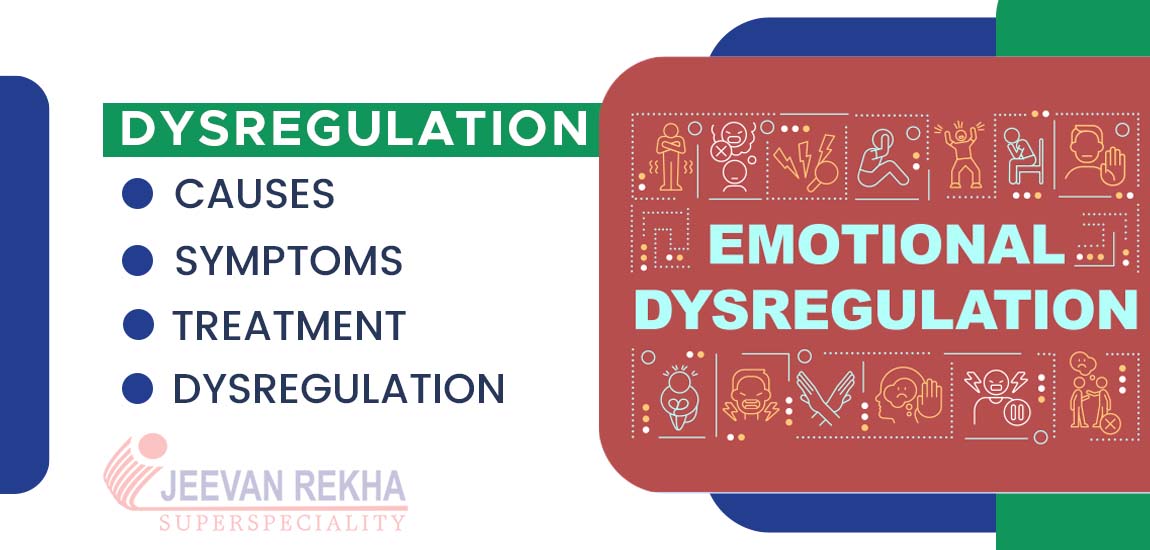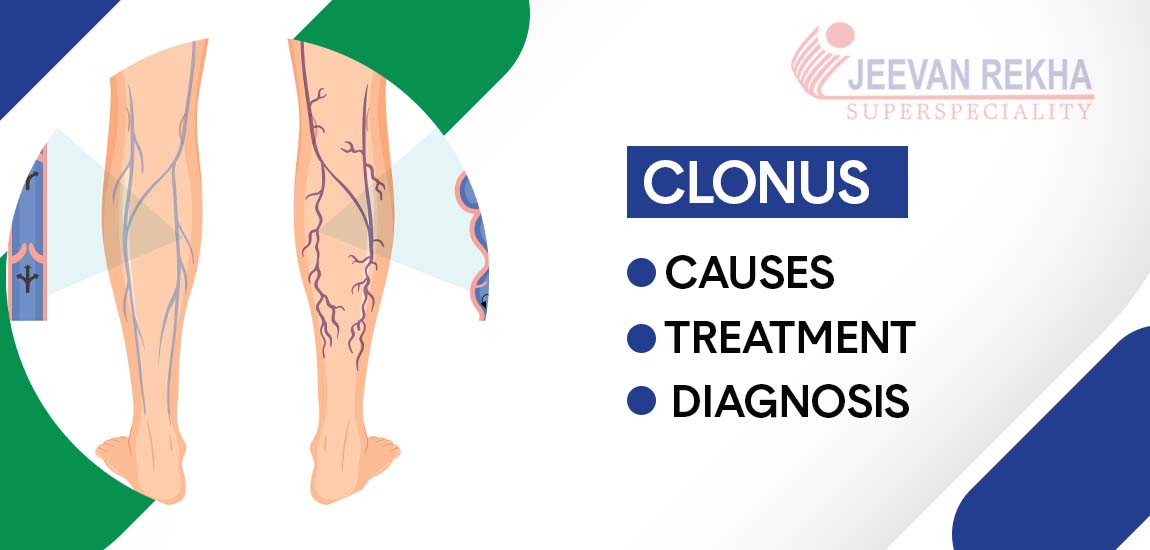
- By JRSH Admin
- In Health and Tips,
- Posted February 07, 2023
Dysregulation: Symptoms, Signs, Causes and Treatment
Managing one's emotional state and behaviour is a complex process that involves initiating, inhibiting, and modulating one's responses to external and internal factors. Basically, the process works like this:
- Subjective experiences (emotions or feelings) are triggered by internal or external events (thinking about something sad or encountering someone angry).
- It is followed by a cognitive response (thought), followed by a physiological response related to emotion (for example, an increase in heart rate).
- This is followed by an action (avoidance, physical action) or expression related to the behaviour.
Keeping thoughts, behaviours, and expressions in a socially acceptable range is an important aspect of emotional regulation.
What Is Dysregulation?
Dysregulation of emotions is characterized by poor emotion regulation and a lack of adhesion to conventional emotional reactions. As well as mood swings, the labile mood may also be described as a marked fluctuation of mood.
The symptoms of emotional dysregulation include angry outbursts, anxiety, depression, substance abuse, suicidal thoughts, self-harm, and other self-damaging behaviours. You may begin to experience difficulties at home, at work, or in your relationships over time due to this condition.
Types of Dysregulation
Emotional dysregulation is most frequently linked to people with borderline personality disorder (BPD). However, in accordance with Marsha Linehan, the creator of Dialectical Behavior Therapy (DBT), individuals with BPD experience dysregulation in the following five areas:
1. Emotion Dysregulation: Having difficulty managing your emotions in context is known as emotion dysregulation. The result is when you don't manage your emotions, regardless of the consequences, in order to reduce or escape them. Among the symptoms of emotional dysregulation are rage, anxiety, depression, and a lack of validation.
2. Interpersonal Dysregulation: Relationships that are in disarray and apprehension about being abandoned are signs of interpersonal dysregulation.
3. Self Dysregulation: Self dysregulation is the combination of an unsteady sense of self and an empty feeling.
4. Behavioral Dysregulation: Self-harm and impulsive behaviours (like substance abuse and promiscuity) are signs of behavioural dysregulation.
5. Cognitive Dysregulation: Paranoia and dissociative reactions that are exacerbated by stressful circumstances are signs of cognitive dysregulation.
When a person with BPD is out of control and not just upset, dysregulation in any of these areas happens. You can gain better control over all of these areas by taking a step back, being more mindful, examining what works, and acquiring new behaviours using the techniques learned in dialectical behaviour therapy.
What are the symptoms of Dysregulation?
The main signs and symptoms of emotional dysregulation are strong emotional reactions and ineffective emotion control. These feelings can range from sadness to annoyance or anger. People who experience chronic emotional dysregulation also experience worsened emotions, which can make them seem exaggerated.
Emotional dysregulation symptoms may include:
- Intense emotional responses in comparison to the circumstances that caused them
- Having trouble calming down
- Self-harm
- Having bad thoughts
- Feeling uncontrollable
- Having a hard time coping in a healthy way
- Severe depression
- Disordered eating
- conflicted interpersonal relationships
- Emotions leaving you perplexed
- Anxiety
- the misuse of drugs
- Self-harming techniques and ideas
- High-risk sexual behaviors
- High levels of shame and anger
- Suicidal thoughts or attempts
Causes of Dysregulation
According to scientists, emotional dysregulation is characterized by a problem with the brain's emotional braking mechanism that is brought on by a decrease in the response of some neurotransmitters. Because of this, a person continuously experiences the "fight or flight" response, in which the pre-frontal cortex malfunctions under stressful circumstances.
There are a number of potential causes for this condition, and it frequently co-occurs with other more serious mental health issues (see below). Some causes include:
1. Child Neglect
When a child is neglected, a caregiver has fallen short of meeting the child's basic needs. In this case, the caregiver is not providing enough physical or emotional care.
2. Early childhood trauma
when traumatic events happen early in life, which is a crucial time for a child's development.
3. Traumatic brain injury
For instance, a severe head injury can result in brain dysfunction.
4. Chronic invalidation
when someone's thoughts and feelings are frequently disregarded, rejected, or otherwise evaluated.
Treatment of Dysregulation
Therapy can help us learn coping skills and techniques to better control our emotions, and medical treatment can help us manage emotional dysregulation as a component of the overall mental disorder.
Medication:
The medications help a lot in every case of disease, anxiety, and depression. Here are some of the medications that can help reduce the stress in our lives.
- Methylphenidate and amphetamine are two common ADHD medications.
- Antidepressants
Therapy:
- Therapy such as dialectical behaviour therapy (DBT)
- Counselling
- Cognitive-behavioural therapy (CBT)
Other effective methods for managing emotional dysregulation include:
- Mindfulness
- Diet and exercise
Emotional dysregulation can get better over time; 88% of people who have been diagnosed with BPD, for instance, are not expected to still meet the requirements in ten years.
Over the past two decades, there has been a plethora of studies on emotion dysregulation as researchers have come to terms with the fact that emotional states can be measured and are thus amenable to scientific analysis.
Prevention Tips for Dysregulation
Your relationships, job, and general quality of life can all be enhanced by being able to effectively control your emotions. According to 2014 research, those who are good at controlling their emotions have lower rates of physical illnesses caused by stress and depression.
You can do a number of things to strengthen your ability to control your emotions, including:
Stay present:
Learn to respond, not to react, is a saying you've probably heard before. When attempting to control your emotions, remember to use this advice.
When we have an unconsidered, mindless reaction to something, our most destructive emotions come out. You can maintain control by being aware of your thoughts, feelings, and behaviour.
Identify your emotions:
Acquire the skill of labelling your feelings as a continuation of remaining conscious. Use phrases like "I'm hurt and confused that she treated me like that" to be more precise. When our emotions are acknowledged and given names, they are less likely to control us without our consent.
Take the opposite action:
In this DBT technique, you essentially act in opposition to how you're feeling. Having severe anxiety? Show assurance. Full of fear? Show bravery. This assists you in keeping in mind that you are ultimately in charge and that your feelings are not fixed.
Regular exercise:
Our bodies can seem to be filled with a lot of energy when we are experiencing strong emotions. Going for a run or engaging in another activity you enjoy could help you let out any pent-up frustration or anger in a healthy way. After that, you'll feel much better.
Avoid Procrastination:
Attempts at managing our emotional states through procrastination have been shown to be ineffective.
Procrastination is the act of actively avoiding unpleasant feelings, whether it's the start of a project, the making of an uncomfortable phone call, or the cleaning of the house. Our stress levels worsen as a result of procrastination, as we all know.
The best strategy for beating procrastination is to start as soon as possible and take frequent, brief breaks.
Tags
Blog Search
Latest Posts
-
Skin Ulcers Uncovered: Causes, Types, Symptoms, and Healing Options
January 13, 2026 -
Is Coconut Water Safe During Pregnancy? Benefits, Risks & Myths
January 08, 2026 -
Dark Circles Under The Eyes: Causes, Home Remedies and Treatments
December 21, 2025 -
बर्ड फ्लू के लक्षण, कारण, उपचार और बचाव के उपाय जानें
December 04, 2025 -
Best Diet Plan for Menopause Weight Management
November 25, 2025




